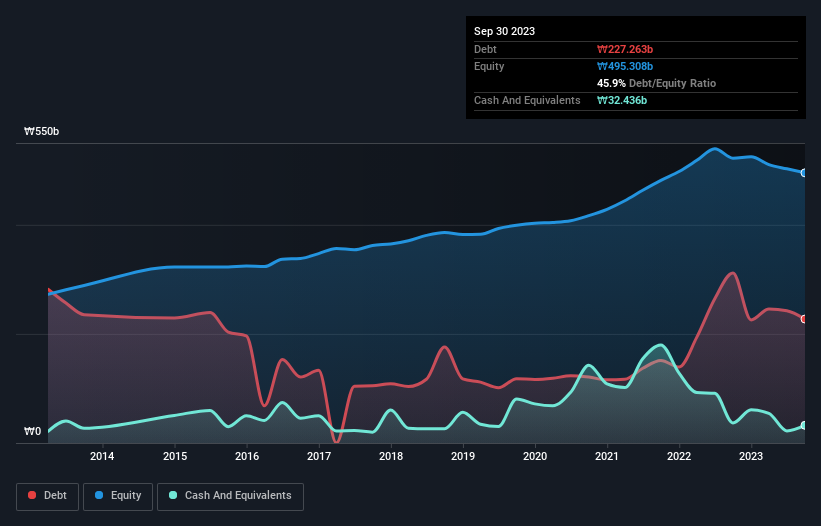- South Korea
- /
- Metals and Mining
- /
- KOSE:A004560
Here's Why Hyundai Bng Steel (KRX:004560) Can Afford Some Debt

David Iben put it well when he said, 'Volatility is not a risk we care about. What we care about is avoiding the permanent loss of capital.' When we think about how risky a company is, we always like to look at its use of debt, since debt overload can lead to ruin. We can see that Hyundai Bng Steel Co., Ltd. (KRX:004560) does use debt in its business. But the real question is whether this debt is making the company risky.
When Is Debt Dangerous?
Debt is a tool to help businesses grow, but if a business is incapable of paying off its lenders, then it exists at their mercy. In the worst case scenario, a company can go bankrupt if it cannot pay its creditors. However, a more frequent (but still costly) occurrence is where a company must issue shares at bargain-basement prices, permanently diluting shareholders, just to shore up its balance sheet. By replacing dilution, though, debt can be an extremely good tool for businesses that need capital to invest in growth at high rates of return. When we examine debt levels, we first consider both cash and debt levels, together.
See our latest analysis for Hyundai Bng Steel
How Much Debt Does Hyundai Bng Steel Carry?
The image below, which you can click on for greater detail, shows that Hyundai Bng Steel had debt of ₩227.3b at the end of September 2023, a reduction from ₩311.8b over a year. However, it also had ₩32.4b in cash, and so its net debt is ₩194.8b.

How Healthy Is Hyundai Bng Steel's Balance Sheet?
According to the last reported balance sheet, Hyundai Bng Steel had liabilities of ₩219.2b due within 12 months, and liabilities of ₩102.9b due beyond 12 months. Offsetting this, it had ₩32.4b in cash and ₩198.5b in receivables that were due within 12 months. So its liabilities total ₩91.1b more than the combination of its cash and short-term receivables.
While this might seem like a lot, it is not so bad since Hyundai Bng Steel has a market capitalization of ₩317.4b, and so it could probably strengthen its balance sheet by raising capital if it needed to. However, it is still worthwhile taking a close look at its ability to pay off debt. The balance sheet is clearly the area to focus on when you are analysing debt. But it is Hyundai Bng Steel's earnings that will influence how the balance sheet holds up in the future. So if you're keen to discover more about its earnings, it might be worth checking out this graph of its long term earnings trend.
Over 12 months, Hyundai Bng Steel made a loss at the EBIT level, and saw its revenue drop to ₩1.1t, which is a fall of 7.7%. We would much prefer see growth.
Caveat Emptor
Over the last twelve months Hyundai Bng Steel produced an earnings before interest and tax (EBIT) loss. Indeed, it lost a very considerable ₩41b at the EBIT level. When we look at that and recall the liabilities on its balance sheet, relative to cash, it seems unwise to us for the company to have any debt. Quite frankly we think the balance sheet is far from match-fit, although it could be improved with time. We would feel better if it turned its trailing twelve month loss of ₩31b into a profit. In the meantime, we consider the stock very risky. The balance sheet is clearly the area to focus on when you are analysing debt. But ultimately, every company can contain risks that exist outside of the balance sheet. Case in point: We've spotted 2 warning signs for Hyundai Bng Steel you should be aware of.
If, after all that, you're more interested in a fast growing company with a rock-solid balance sheet, then check out our list of net cash growth stocks without delay.
Valuation is complex, but we're here to simplify it.
Discover if Hyundai Bng Steel might be undervalued or overvalued with our detailed analysis, featuring fair value estimates, potential risks, dividends, insider trades, and its financial condition.
Access Free AnalysisHave feedback on this article? Concerned about the content? Get in touch with us directly. Alternatively, email editorial-team (at) simplywallst.com.
This article by Simply Wall St is general in nature. We provide commentary based on historical data and analyst forecasts only using an unbiased methodology and our articles are not intended to be financial advice. It does not constitute a recommendation to buy or sell any stock, and does not take account of your objectives, or your financial situation. We aim to bring you long-term focused analysis driven by fundamental data. Note that our analysis may not factor in the latest price-sensitive company announcements or qualitative material. Simply Wall St has no position in any stocks mentioned.
About KOSE:A004560
Hyundai Bng Steel
Manufactures and sells stainless steel products and automobile parts in South Korea.
Flawless balance sheet and good value.
Market Insights
Community Narratives




